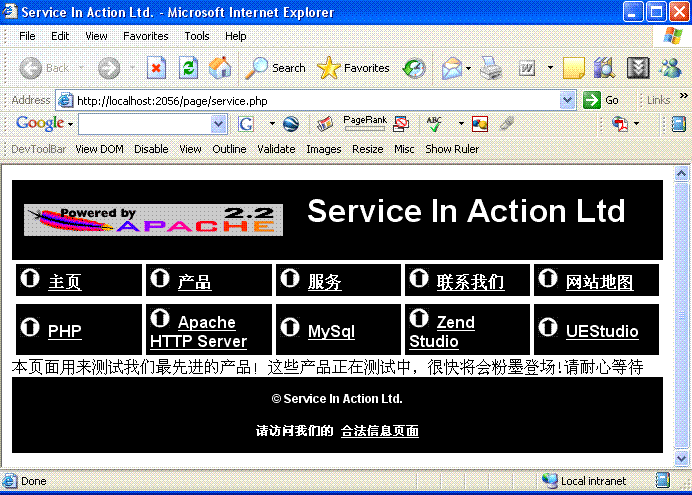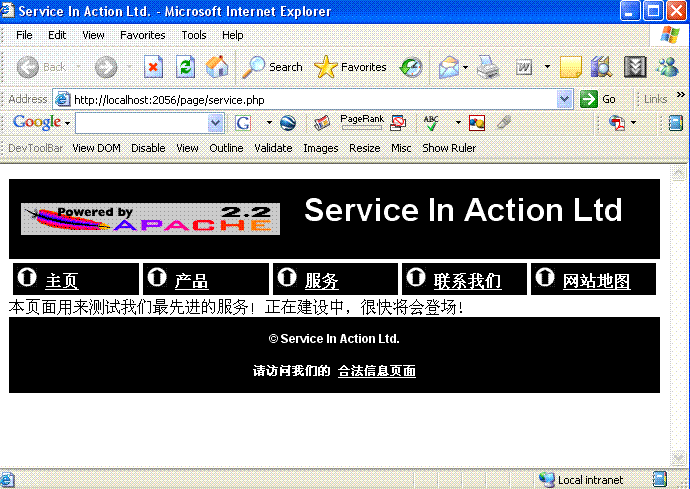PHP 14:类的实例
在本章中我们将介绍一个实例,来进一步对类加深了解。
本章构建一个Page类,它代表了一个页面。其中有显示页面的title,样式,内容等函数。
此页面的效果如下:
我们将把这个页面分成几块:
1)有图的那一块。
2)有导航按钮的那一块。
3)中间文字的一会
4)页底的这一块
具体看看代码吧:
1 <?php
2 class Page
3 {
4 //Page Title
5 public $title="Service In Action Ltd.";
6
7 //Page content.
8 public $content;
9
10 //Page keywords.
11 public $keywords="Service ,Action, Field Service, On Demand";
12
13 //Page tabs navigation
14 public $buttons= array(‘主页‘=>‘Service.php‘,
15 ‘产品‘=>‘products.php‘,
16 ‘服务‘=>‘Service.php‘,
17 ‘联系我们‘=>‘Contact.php‘,
18 ‘网站地图‘=>‘Sitemap.php‘);
19
20 //To set page‘s attributes, such as title,content.
21 public function __set($name,$value)
22 {
23 $this->$name=$value;
24 }
25
26 //To display title
27 public function DisplayTitle()
28 {
29 print "<title>{$this->title}</title>";
30 }
31 public function DisplayContent()
32 {
33 print $this->content;
34 }
35
36 //To set the header meta, and set the page keyword so that search engine to scrawl it.
37 public function DisplayKeywords()
38 {
39 print "<meta name=\"keywords\" content=\"{$this->keywords}\" />";
40 }
41 public function DisplayPage()
42 {
43 print "<html>\n<header>";
44 $this->DisplayTitle();
45 $this->DisplayStyles();
46 print "</header>\n<body>";
47 $this->DisplayHeader();
48 $this->DisplayMenus($this->buttons);
49 $this->DisplayContent();
50 $this->DisplayFooter();
51 print "</body>\n</html>";
52 }
53 public function DisplayStyles()
54 {
55 ?>
56 <style>
57 h1 {color:white; font-size:24pt; text-align:center;
58 font-family:arial,sans-serif}
59 .menu {color:white; font-size:12pt; text-align:center;
60 font-family:arial,sans-serif; font-weight:bold}
61 td {background:black}
62 p {color:black; font-size:12pt; text-align:justify;
63 font-family:arial,sans-serif}
64 p.foot {color:white; font-size:9pt; text-align:center;
65 font-family:arial,sans-serif; font-weight:bold}
66 a:link,a:visited,a:active {color:white}
67 </style>
68 <?php
69 }// DisplayStyles()
70
71 public function DisplayHeader()
72 {
73 ?>
74 <table width="100%" cellpadding ="12" cellspacing ="0" border ="0">
75 <tr bgcolor ="black">
76 <td align ="left"><img src = "logo.png" /></td>
77 <td>
78 <h1>Service In Action Ltd</h1>
79 </td>
80 <td align ="right"></td>
81 </tr>
82 </table>
83 <?php
84 }
85
86 //To shoe navigation bar
87 public function DisplayMenus($buttons)
88 {
89 if(is_array($buttons)&&count($buttons)==0) return;
90 print "<table width=‘100%‘ bgcolor=‘white‘ cellpadding=‘4‘ cellspacing=‘4‘\n";
91 print " <tr>\n";
92
93 //calculate button size
94 $width = 100/count($buttons);
95
96 while (list($name, $url) = each($buttons))
97 {
98 $this -> DisplayButton($width, $name, $url, !$this->IsURLCurrentPage($url));
99 }
100 print " </tr>\n";
101 print "</table>\n";
102 }
103
104 //Judge the URL is current page.
105 public function IsURLCurrentPage($url)
106 {
107 if(strpos($_SERVER[‘PHP_SELF‘], $url )==false)
108 {
109 return false;
110 }
111 else
112 {
113 return true;
114 }
115 }
116
117 //To show the buttons.
118 public function DisplayButton($width, $name, $url, $active = true)
119 {
120 if ($active)
121 {
122 print "<td width =‘$width%‘>
123 <a href =‘$url‘>
124 <img src =‘s-logo.gif‘ alt =‘$name‘ border =‘0‘ /></a>
125 <a href =‘$url‘><span class=‘menu‘>$name</span></a></td>";
126 }
127 else
128 {
129 print "<td width =‘$width%‘>
130 <img src =‘side-logo.gif‘>
131 <span class=‘menu‘>$name</span></td>";
132 }
133 }
134
135 //To show Footer.
136 public function DisplayFooter()
137 {
138 ?>
139 <table width = "100%" bgcolor ="black" cellpadding ="12" border ="0">
140 <tr>
141 <td>
142 <p class="foot">© Service In Action Ltd.</p>
143 <p class="foot">请访问我们的
144 <a href ="">合法信息页面</a></p>
145 </td>
146 </tr>
147 </table>
148 <?php
149 }
150 function iterateVisible() {
151 echo "MyClass::iterateVisible:\n";
152 foreach($this as $key => $value) {
153 print "$key => $value\n";
154 }
155 }
156
157 }//class Page
158
159 $page=new Page();
160 $page->content="本页面用来测试我们最先进的服务!正在建设中,很快将会登场!";
161 $page->DisplayPage();
162 //$page->iterateVisible();
163 ?>
此类还提供了很多方法。一一介绍一下了:
1)DisplayTitle
显示页面的标题。
2)DisplayContent
显示页面的内容,就是上面说的第3块。
3) DisplayKeywords
显示页面的关键字
4) DisplayStyles
显示页面的样式
5) DisplayHeader
显示页面的头部,即上面的第一块
6)DisplayMenus
显示菜单或者导航按钮,也就是上面的第2块
7)DisplayFooter
显示页脚,上面说的第4块。
此类还是比较简单的。不再多说。熟悉一下就可以了。
让我们看看继承吧。假设有一个类用来显示Product。所以我们可以建立一个类ProductPage,并且它继承Page。改变以下显示的Button以及内容即可。
代码如下:
{
private $line2buttons=array(‘PHP‘=>‘PHP.php‘,‘Apache HTTP Server‘=>‘Apache.php‘,
‘MySql‘=>‘mysql.php‘,‘Zend Studio‘=>‘ZendStudio.php‘,
‘UEStudio‘=>‘http://www.ultraedit.com‘);
public function DisplayPage()
{
print "<html>\n<header>";
$this->DisplayTitle();
$this->DisplayStyles();
print "</header>\n<body>";
$this->DisplayHeader();
$this->DisplayMenus($this->buttons);
$this->DisplayMenus($this->line2buttons);
$this->DisplayContent();
$this->DisplayFooter();
print "</body>\n</html>";
}
}
$page=new ProductPage();
$page->content="本页面用来测试我们最先进的产品!这些产品正在测试中,很快将会粉墨登场!请耐心等待";
$page->DisplayPage();

具体代码就不说了。
代码下载点击这里
以上就是类的应用了。
郑重声明:本站内容如果来自互联网及其他传播媒体,其版权均属原媒体及文章作者所有。转载目的在于传递更多信息及用于网络分享,并不代表本站赞同其观点和对其真实性负责,也不构成任何其他建议。






































